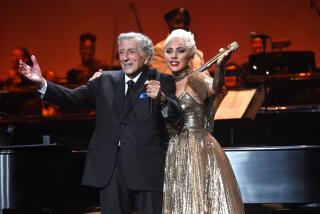The Reviews : Classy Supplements to the Classics
- Share via
FRANK SINATRA
“Duets”
Capitol
* * * 1/2
Amazing. The Chairman of the Board, approaching his 78th birthday, goes back into the studio for the first time in almost a decade to record duet versions of his greatest hits with some of the most popular singers in the world.
It’s a concept that might have daunted lesser artists. Sinatra with Tony Bennett? Sure. With Barbra Streisand, Natalie Cole and Charles Aznavour? Why not?
But Sinatra with Aretha Franklin? With Luther Vandross? With Bono ?
Amazing, indeed. Because, for the most part, Sinatra brings it all off. In many cases, the duet versions afford strikingly different perspectives--supplements, if not replacements, for the originals.
His voice is not what it was 30 years ago. But Sinatra has always valued musical presence and truthfulness far more than sheer technical accuracy, and presence and truth are precisely what emerge on many of these tracks.
Listen to the way the jaunty mixture of Bennett’s bright tenor and Sinatra’s sumptuous baritone on “New York, New York,” change the tone from the upfront challenge of Sinatra’s seminal reading to the tale of a couple of buddies out on the town. Even better is the side-by-side rhythmic drive of Natalie Cole and Sinatra on “They Can’t Take That Away From Me”--a performance that expands the jazz qualities of the original.
Vandross’ smoothly mellow counterpoint on “The Lady Is a Tramp” and Franklin’s soulful preaching on “What Now My Love” are superb variations on Sinatra’s archetypal renditions. And the elegant, soaring alliance of Streisand and Sinatra on “I’ve Got a Crush on You” provides a timeless example of love-song singing.
U2’s Bono--on “I’ve Got You Under My Skin”--has a surprisingly intuitive grasp of the combination of swing and subtle sensuality that is intrinsic to the Sinatra style. Gloria Estefan and Carly Simon, in contrast, sound surprisingly low-keyed, even somewhat intimidated by the surroundings.
The closing “All The Way”/ “One for My Baby” (with saxophone fills by Kenny G) establishes a new standard for this often poorly handled standard, in part for the depth of Sinatra’s world-weary interpretation, but especially for the poignant symbolism of his partially improvised tag line, “Man, it’s long, it’s a long . . . long . . . long road.”
More to Read
The biggest entertainment stories
Get our big stories about Hollywood, film, television, music, arts, culture and more right in your inbox as soon as they publish.
You may occasionally receive promotional content from the Los Angeles Times.










